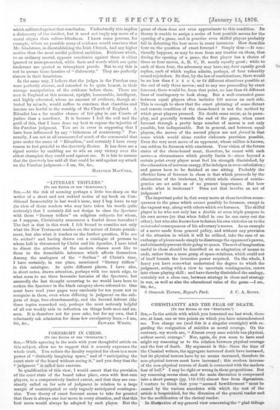FORESIGHT IN CHESS.
[To THR EDITOR OT THE "SPR0TAT0R.1 Sin,—While agreeing in the main with your thoughtful article on this subject, allow me to suggest that it scarcely expresses the whole truth. You reduce the faculty required for chess to a mere power of "distinctly imagining space," and of "anticipating the exact state of the board without seeing it," and you deny that the 4' judgment" is called into exercise.
In qualification of this view, I would assert that the prevision of the exact state of the board takes place, even with first-rate players, to a comparatively limited extent, and that they are con- stantly called on for acts of judgment in relation to a large margin of unanticipated or only vaguely anticipated contingen- cies. Your theory of exact forecast seems to take for granted that there is always one best move in every situation, and that this best move would always be adopted by each player. But the -game of chess does not even approximate to this condition. Its theory is unable to assign a series of best possible moves for the opening of a game, and in practice even skilful players probably fail in detecting the best move in many instances. How does this bear on the question of exact forecast ? Simply thus :—It con- tinually happens, as may be seen from any treatise on chess, that during the opening of a game, the first player has a choice of three or four moves, A, B, C, D, nearly equally good ; while to. each of these four, the adversary may have, say, four equally goods replies, each of which replies admits, perhaps, of four tolerably sound rejoinders. So that, by the law of combinations, there woul4 be no less than 4 x 4 x 4, or 64 different situations possible at the end of only three moves ; and to any one proceeding by exact forecast, there would be, from that point, no less than 64 different lines of contingency to look along. But a well-contested game between equal players often includes 100 moves on each side.. This is enough to show that the exact picturing of some distant and remote condition of the chess-board is not the method by which great players proceed. No doubt cases occur, as in pawn- play, and generally towards the end of the game, when exact forecast through a pretty large number of moves is not only possible, but indispensable. But in general, and between equal players, the moves of the second player are not forced in that sense which would alone render elaborate prevision possible. Even the very next move of an opponent, whose calibre is known, can seldom be foreseen with exactness. Your vision of the future states of the chess-board must, therefore, be recast with each move—a circumstance which greatly limits it—since beyond a certain point every player must feel his strength diminished, by the exhaustion of nervous energy, if he indulges in over-calculation and games have to be finished at one sitting. Probably the effective form of forecast in chess is that which proceeds by the elimination of the irrelevant, by which whole classes of contin- gencies are set aside as of no present importance. But how decide what is irrelevant ? Does not that involve an act of judgment?
The important point is, that every move at chess involves conse- quences to the game which cannot possibly be foreseen, except in the vaguest way, along with others which are foreseen. The skilful player is he who not only has a double or even triple purpose in his own moves (so that when foiled in one he can carry out the- other), but who also knows how to fasten his own victories on to the unintended consequences of his adversary's moves. As an example of a move made from general policy, and without any prevision of the situation in which it will be utilised, take the case of an exchange of pieces made simply to disarrange the opponent's pawns, and ultimately prevent their going to queen. The sort of imagination useful in chess should be described as an adaptation of means to- ends, rather than a mere grasp of space-relations, which could not of itself furnish the inventive power required. On the whole, I fancy you have somewhat underrated the degree to which the- judgment, acting with a view to uncertain contingencies, enters into chess-playing skill ; and have thereby diminished the analogy,. certainly not a close one, between strategy in chess and strategy in war, as well as also the educational value of the game —I am,. Sir, &c., 3 Ormonde Terrace, Regent's Park. J. C. A. Scorr.


































 Previous page
Previous page